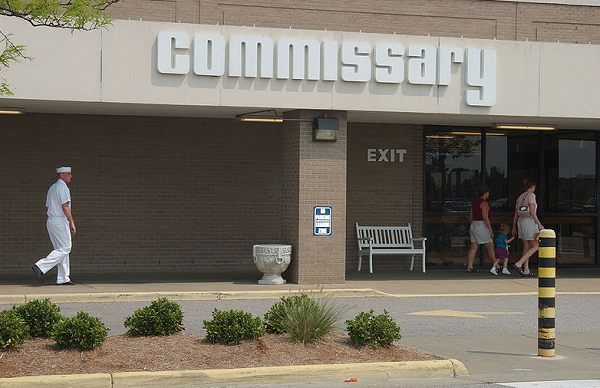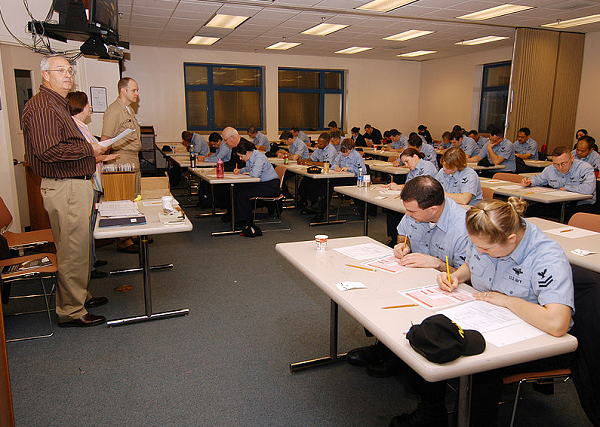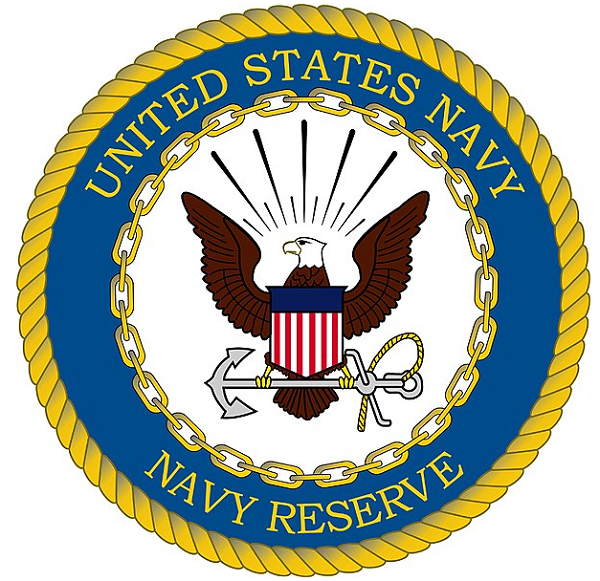You understand how the Reserves works: You attend drill one weekend a month plus training two weekends a year, but is that all that they have to offer?
Being part of the Navy Reserves offers benefits that can help you in many different facets of your life.
Not only does the Navy Reserve benefits you receive help you, they can help with your civilian careers and provide benefits to your family.
Below you will find information on five benefits of joining the U.S. Navy Reserves and a list of benefits that all military reserves offer.
Jump To A Section
1. Commissary and Exchange

One privilege when on active reserve is the ability to take advantage of lower costs at a commissary or exchange.
This benefit provides lower costs on everything from groceries to clothing.
Related Article – Navy Uniform Regulations
Commissary
A commissary is a supermarket that sells products at cost plus a 5% surcharge.
Shopping at a commissary allows for significantly lower prices on goods such as food, cleaning, and laundry products.
To be qualified to shop at a commissary, a reservist must have a qualifying year towards retirement, with 50 retirement points.
There are several ways to receive retirement points including:
- 1 point for each day of active service
- 1 point for drill period attendance
- 1 point for each day of performing funeral honors duty
- 15 points for completing each reserve component membership year
Once 50 retirement points have been accumulated, reservists can apply for a Commissary Privilege Card that is valid for 24 shopping days in a calendar year.
This benefit can be used by military spouses or authorized dependents when the reservist is not there.
If you happen to be called into active duty, the shopping privileges are updated to be able to go to the commissary daily.
Related Article – 10 Benefits Of Being A Military Wife (and 5 not-so good things)
Exchange
Navy Exchanges are military department and drug stores.
You do not have to receive 50 retirement points to go to the exchange.
Both you, your dependents, and spouse can go to the exchange any time you would like as long as you have a military ID.
2. Civilian Job Rights and Protections
One of the perks of joining the Navy Reserves is that you can keep your civilian job and still serve your country.
But what happens to your job if you receive active duty orders? Are you protected?
While your exact position and job duties may not be held, you can rest assured knowing that your job is protected through the Uniformed Services Employment and Reemployment Rights Act, (USERRA).
This reemployment right will protect you while you are performing uniformed service.
There are just three key areas that you must meet to qualify:
- Advanced notice must be given to your employer
- the length of absence cannot be more than 5 years
- the character of the person in service was not adverse.
Other rules apply such as returning to work within certain time-frames.
Related Article – How To Join The US Navy
3. Navy Reserve Pay
Note: See our full article on Navy Reserve Pay here.
Being in the Navy Reserve provides an additional income for those who may be working full time or attending school.
Navy Reserve pay is based on rank, time in service and qualifications.
The Navy pays reservists the same as active duty personnel who meet the same above specifications.
For every two days of traditional weekend drilling, you will receive four days of base pay.
When completing the required two weeks of annual training, reservists will receive full active duty pay.
Any additional days that you serve are paid on the same guidelines.
The base pay for reservists is just a prorated portion of active duty pay.
The base table below provides an outlook on Navy Reserve pay based on rank.
| Pay Grade | Less than 2 Years | Over 2 Years | Over 3 Years | Over 4 Years | Over 6 Years |
|---|---|---|---|---|---|
| E-1 (less than 4 months) | $236.40 | N/A | N/A | N/A | N/A |
| E-1 | $255.68 | $255.68 | $255.68 | $255.68 | $255.68 |
| E-2 | $286.56 | $286.56 | $286.56 | $286.56 | $286.56 |
| E-3 | $301.35 | $320.28 | $339.68 | $339.68 | $339.68 |
| E-4 | $333.80 | $350.88 | $369.88 | $388.64 | $405.24 |
| E-5 | $364.04 | $388.56 | $407.36 | $426.56 | $456.52 |
| E-6 | $397.40 | $437.32 | $456.64 | $475.40 | $494.92 |
| E-7 | $459.44 | $501.44 | $520.68 | $546.04 | $565.96 |
In addition to base pay, Navy Reservists have opportunities for bonuses and special pay.
Bonuses can vary based on individual cases, but are generally offered as sign-on bonuses or affiliation bonuses.
Potential special pay opportunities are available for certain skills, special duty assignments, or serving in high-demand career areas.
Related Article – Navy PRT Standards For Males and Females
4. Deployment/Mobilization Deferment
For those with prior Navy service, including Navy Reserve service, there is an opportunity to have a deployment/mobilization deferment.
This opportunity is available to encourage individuals with prior military service to join the Reserves without the fear of having back-to-back deployments.
It also allows soldiers to find a new civilian job and housing in the community without having to worry about leaving the new job or location right away.
Individuals are considered NAVETs if they had their most recent active duty tour or training in the Navy or Navy Reserve, have been released or discharged for over 24 hours, and completed 12 consecutive weeks or active duty or training.
NAVETs who are within six months of release from their active duty tour can receive a two-year deferment.
Those who are within 7-12 months of release from their active duty tour can receive one year of deferment.
This benefit is great for those who are considering joining the Reserves after serving in an active duty role.
Related Article – 5 Absolutely Worst Jobs In The US Navy
5. Education

The Navy has significant resources when it comes to assisting with education.
Being in the Reserves offers the time that is needed to focus on studies, in addition to opportunities that could allow you to attend college for free.
The education programs below have different requirements and provide education assistance in areas such as tuition, civilian job search, certification opportunities and more.
Montgomery GI Bill- Selected Reserve- This educational program provides up to 36 months of education benefits based on the type of training and full-time or half-time status. Reservists are eligible after completing Active Duty for Training, having a high school diploma, being in good standing and signing up for a minimum six-year obligation. Find more information here.
Post 9/11 GI Bill- The Post 9/11 GI Bill is open to reserve members who have at least 90 days of active duty service. This helps with education tuition and remaining benefits may even transfer to dependents. Details can be found here.
Navy COOL- This resource provides information on specific ratings in the Navy, related civilian careers, credentialing opportunities, and more information. You can find the NAVY COOL website here.
DANTES Examination Programs- The examination programs allow you to earn college credit by taking exams. The College-Level Examination Program (CLEP) allows you to take any 33 entry-level college subject exams and earn college credits for the ones you pass. DSST exams allow you to take one of 38 subject areas in certain disciplines to earn college credit. All exams are funded by DANTES. Learn more here.
Troops to Teachers- This program helps veterans who would like to transition into teaching. It provides guidance on training, tuition, and job search. Troops to Teachers website can be found here.
Classroom Opportunities- The Navy has multiple channels that provide officer or general education through the Navy War College, Senior Enlisted Academy, Navy College Program, and Navy ELearning. Costs and assistance opportunities vary based on location and program.
Related Article: Does The National Guard Pay For College?
Reserve Benefits
Each reserve component, whether they are Army, Navy, Marine Corps, Coast Guard, or Air Force offer basic benefits that are universal.
They include:
- Insurance through TriCare
- Drill Pay
- Direct Deposit
- Job Protection
- Life Insurance
- Education Services
While the benefits are universal between all reserve members, some specific details may vary.
Related Article – Navy A School: A list of all 24 locations
Conclusion
Joining the Navy Reserves, with or without prior service, allows individuals to have the freedom of a civilian life, while completing drills close to home.
This is one of the largest benefits of the Reserves program, but joining the Navy Reserves also provides other benefits that can have an impact on your decision to join, or even provide assistance if you have joined and were not aware that it was available.
Navy Reserve members have access to the commissary and exchange to find lower cost goods.
When you join the Reserves, your civilian job is protected when you deploy or enter into active duty.
Your pay is based on the same specifications as active duty personnel and is prorated to include your part-time days.
Other benefits allow individuals to defer mobilization when they have recently returned from duty or provide education assistance through different programs and schools.
With all of the above benefits considered, joining the Navy Reserves makes for a great opportunity to improve yourself and your future.
Related Article – Military Terms/Slang
Resources
- Navy Promotion Timeline for Enlisted & Officers - June 19, 2024
- Navy SEAL Training (BUD/S) - June 19, 2024
- Navy Aircraft Carrier Flight Deck Shirt Colors Explained - June 19, 2024


